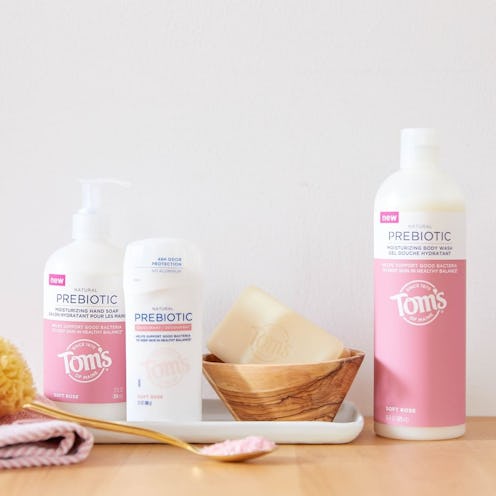(Beauty)
Why Everyone Should Be Talking About Prebiotics Just As Much As Probiotics

There's a reason why we hear about probiotics more than prebiotics. Probiotics, the good-for-the-gut organism that's found in vitamins, fermented foods, and dairy products is a vital addition for anyone looking to enhance the state of their overall wellness. However, its sister, prebiotics, often doesn't receive as much praise, neglected for the longer standing organism that's undoubtedly more popular. But just as important as probiotics are for the inside, prebiotics for skincare are proving to be just as imperative for a healthy skin barrier that can withstand the harsh environmental elements.
Benefits Of Prebiotics In Skincare
As many other ingestible ingredients prove good for the outside — think avocado and honey — prebiotics are as well. "They can do wonders for the skin's barrier," Josie Holmes, esthetician at SKINNEY Medspa in New York City, tells TZR. "The skin is the largest organ in the body, and it too works in balancing good and bad bacteria." And Dr. Amy Shah, MD, a double board-certified doctor, and Tom's Of Maine spokesperson agrees. "The key for applying prebiotics into our skin care routine is to ensure that our skin is in the right pH to protect the natural barrier from breaking down and letting external toxins pass through it," she says. Reason being, the skin being in constant alkalization has the capacity to throw the acidic mantle out of balance. Once that happens, you're more at risk for skin inflammation, dermatitis, eczema and atopic skin diseases. "To prevent this, you should try to incorporate prebiotics and probiotics foods in your diet together with the use of skin care products that contain prebiotics."
Why Prebiotics And Probiotics Should Be Used Together
"Probiotics are an actual bacteria that can replenish the gut bacteria —but they get killed by the body, especially if it’s not from the natural habitat," Dr. Shah says. In contrast, prebiotics are a form of dietary fiber found in food that selectively feeds the good bacteria."
And while the two may be vastly different, incorporating both into your daily lives is a recipe for success. "It is very important that we include foods rich in probiotics and prebiotics," Dr. Shah says. "For probiotic foods, try consuming fermented foods such as pickled vegetables, kimchi, sauerkraut, kombucha, coconut, kefir, and miso. And add prebiotic foods like garlic, asparagus, bananas, chicory root, leafy greens, onion, honey, artichoke, and dandelion greens in, too."
By including a variety of foods in our diet, we can ensure that we are consuming a range of prebiotics and probiotics that help us have friendly bacteria predominance. Paired with prebiotic skincare, optimal health both on the inside and outside can be reached, she says.
But when it comes to who should incorporate the pair of organisms in their beauty routines, studies show that those with dry skin experience the most drastic results. According to the Dermatology Times, the combination of prebiotic and probiotic beauty resulted in findings that revealed those with atopic dermatitis experienced immense relief after following a skincare regimen consisting of the two.
So ahead, check out the prebiotic skincare products the experts are using, raving about, and can kick-start your journey to hydrated and radiant skin.